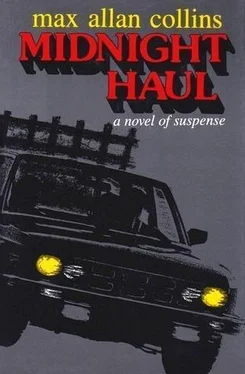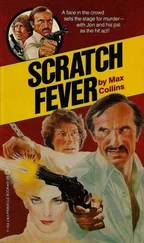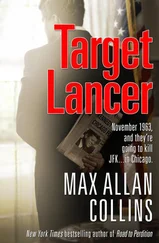He wasn’t exactly pointing it at Patrick, but to make him feel better, Crane tossed it over on the bed, where it made a thud, and said, “Come in.”
Patrick shut the door behind him, took off the wire frames and tried to polish the fog away with his shirt front.
“What do you want, Patrick?”
“Are you all right?”
“I’m fine.”
“You seem kind of...”
“I’m fine, Patrick. What do you want?”
“I don’t know, exactly. Can I sit down or something?”
Crane shrugged. He sat on the edge of the bed and waited for Patrick to do something. Patrick glanced around, saw the chair by the dresser and pulled it over and sat across from Crane. He leaned forward, hands clasped together, draped down between his legs; he looked nervous. Disturbed.
“What do you want, Patrick?”
“I may know something.”
Crane didn’t say anything.
“I may know who set the fire at the house,” Patrick said. It was like a child admitting he’d been in his mother’s purse.
Crane’s hands tightened into fists; he didn’t ask them to, they just did. “Who?”
“I don’t know their names or anything...”
“ Who , Patrick?”
“A couple of truck drivers. Some of the neighbors told the police they saw two men, that morning, walking around with ski masks on. Dressed like hunters, is how my one neighbor described them.”
“How else did she describe them?”
“One was a tall skinny man. The other was shorter but huskier.”
Crane nodded.
“You know them?” Patrick asked.
“Sort of. They’re the ones that buried me.”
“Crane... what are you talking about? You said that before, what do you mean, buried you?”
Crane told him the story; it didn’t take long.
Patrick rubbed his forehead, held the wire frames away from his face as if he didn’t really want to see things clearly.
“I... don’t think they were trying to kill you,” he said. “They were just... trying to scare you off, I’m... sure.”
“Wouldn’t a beating have sufficed?”
“I think they must’ve thought that if they... stopped just short of killing you... really put you through the wringer... you’d give up. You’d go home. A simple beating might just spur you on. Convince you you’re on the right track.”
“What track is that, Patrick?”
“I don’t know! I’m speculating. Crane, I’m not really involved in this.”
“That’s an interesting way to look at it.”
“I don’t even know if I’m right. But... from what you say about what happened to you... the burial and all... I’m afraid I am. Right, I mean.”
“What are you getting at, Patrick?”
He let out the heaviest sigh Crane ever heard. Said, “I think these are the same guys who did some hauling for Kemco, awhile back. I paid them. Cash. All very sub-rosa , you know? But that’s the extent of my involvement. I had nothing to do with what they did to you. Do you think I’d have my own house burned? Risk my son’s life? Or Annie’s?”
“Neither one was home, at the time, conveniently enough. And it wasn’t your house, not till Boone tried to...”
“Tried to what , Crane? Don’t tell me you’ve come to believe she did try to commit suicide? What’s changed your mind all of a sudden?”
Crane said, “Who are they, Patrick?”
“I don’t even know their names,” Patrick said, lifting his shoulders, a pathetic, almost helpless expression on his face. He really was trying. “All I know is they work for an outfit called Chemical Disposal Works.”
Crane sat up. “In Elizabeth?”
That surprised Patrick. “That’s right,” he said. “They got in some trouble with the state awhile back, and that’s why we had to go under the table with paying them while they were still doing work for us.”
“Are they hauling for Kemco, now?”
“Yeah. Right now, in fact. They picked up a load tonight. It might even be those same two truckers, for all I know. It’s not a big company.”
Crane got up and went to the door and opened it; the cold air rushed in like a wave.
“Thank you, Patrick,” Crane said.
Patrick got up slowly, went to the door and said to Crane, “Yeah, well, I should be getting back to Billy. I don’t like leaving him alone.”
He went out, and as Crane was closing the door, Patrick glanced back and said, “What are you going to do?”
“Change my plans,” Crane said.
He had nearly two hours to himself, in the car, on the drive to Elizabeth. It was about midnight when he started out, and there wasn’t much traffic on the turnpike; he was in Laurie’s car, the Buick she’d been driving him around in, taking him daily to see Boone at the hospital.
When she saw him at the door, Laurie had been momentarily excited, thinking there was some news about Boone; not happy, not frightened, just excited: any news about someone who’s been in a coma for a period of time is big news. But that wasn’t why he had come; he was there because he needed her car. She started to ask why, but apparently something in his manner had stopped her. She’d merely said, “Of course you can borrow the car,” and went and got the keys.
He’d made sure she didn’t see the gun; he had it stuffed in his belt, under his jacket, the same jacket the hospital gave him earlier that day, an oversize thing that hung on him like he’d been sick and lost weight.
Now the gun was on the seat next to him.
He wasn’t exactly sure what he was going to do with it. Maybe protect himself. Maybe something else. He didn’t have it thought out. He didn’t think about what he was going to do when he got there. He just drove. He was aware of something on his face that might have seemed like a smile, to an observer. He wasn’t sure what it was himself, when he glimpsed it in the rearview mirror; but it wasn’t a smile.
And he wasn’t sure what he would do when he faced those two truckers. He just knew he was going to face them.
He wasn’t thinking about killing them. The thought surfaced a few times that this was what he might do, but that was as far as his thought processes went. The idea of killing someone would’ve seemed absurd, impossible to Crane a month ago. A day ago. But now he was different. He had sat on the edge of the abyss and looked in.
By the time he was driving down that industrial stretch, with buildings and machinery and hovering UFO-like gas tanks on either side of him, the night giving all of it an unreal look, like an amusement park, he could hear someone laughing in the car, softly. He was a little surprised to find out it was him.
There were a couple of outdoor lights on poles near the warehouse, but otherwise Chemical Disposal Works was dark. The light from the industrial row Chemical Disposal Works was at the dead-end of, on a little peninsula reaching into an inlet of the Elizabeth River, was enough to let him see the vast city of barrels, stacked four high, at the center of which, like City Hall, was the warehouse with its windows painted out black.
He left the Buick alongside the road, half a block away, gun stuck in his waistband, and soon was walking down the cinder drive he and Boone had come down not long ago, barrels on either side, many of them corroded, leaking; he stepped in a thick puddle of something not unlike molasses in consistency, oozing from the base of one. Up ahead he could see that same tan station wagon parked to the right of the loading-dock area; next to it was a battered, dusty pick-up truck. The pick-up was the one Crane rode in the back of, in a barrel, the night before.
The other truck, the flatbed, wasn’t here, unless it was pulled inside.
Читать дальше












